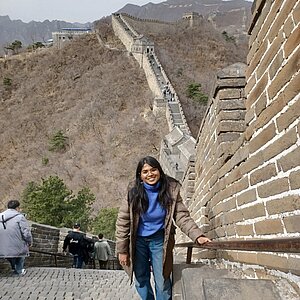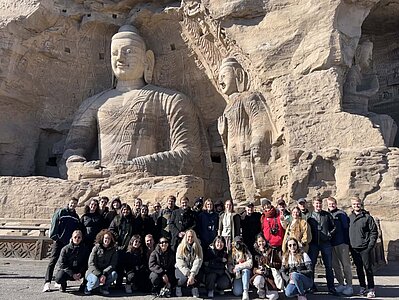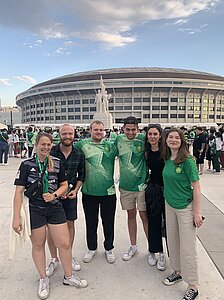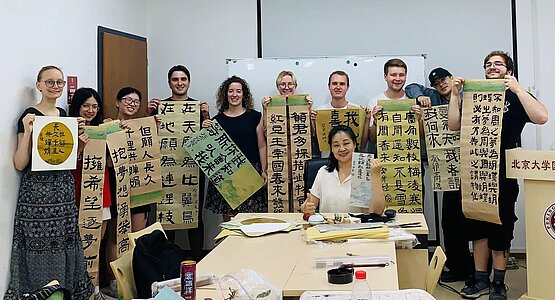Outgoing
On this page, students of the University of Würzburg report on their experiences during their stay abroad at a Chinese university. The reports are intended to give an impression of normal everyday student life in China and to ease interested parties' anxiety of studying in China. If you have any questions, please contact the China Competence Centre: chinacentre@uni-wuerzburg.de . We will also be happy to put you in touch with other students who have had experience studying in China.

On my first day in Beijing, I remember accidentally saying entschuldigung (I only speak A1 level German) to a shop assistant at a convenience store. I could not have been more embarrassed but I made up for it by talking to that shop assistant in Chinese right after. I found myself trying really hard to prove the fact I am not the laowai who knows nothing about China. But, being here I discovered how little I actually knew and I found myself wanting to know more and more. The best part was when I realized that I’m learning so much everyday not only in classrooms but also from the small conversations I had with the people on the streets, in the university clubs and cafeteria, with the cleaning lady that I always ran into in the library corridor or the little kids I chatted with on my way to the Great Wall of China, these are most beautiful learning experiences I could ever ask for.
Being able to visit the China I often read about in books and watched in news and movies, being able to finally talk to people in a language I studied for years, it has all been a dream come true. As we approach the end of this semester and also of my stay in China I just realize I can't wait to come back.

If you are considering to visit Beijing or not, after four months living and studying in the capital of China, I can say: It is definitely worth a visit! Currently, I’m studying in my master’s China Language and Economy in the ECLC program of Beijing University. As I’m a Master student I only have classes in the afternoon, which gives me enough time to experience the life in Beijing.
The classes I’m visiting are mostly Chinese language classes in the fields of economics, culture and news to gain knowledge about China’s culture and improve my language skills. Next to the classes there are many activities offered at Beida. It’s possible to join all kind of clubs, such as sport clubs like Sanda (combination of Kung Fu and Kickboxing), tennis, skateboarding and many more or you can join other clubs like cooking and baking, playing Mahjong, debating and more. As the students from Würzburg University are living in the dorm quite close to the campus it is also convenient to go to the canteen for breakfast, lunch and dinner. Beijing University has more than 25 canteens on campus, which offer various food from different regions in China. You can for example try the Sichuan cuisine, Dong Bei cuisine, eat Hot Pot or take out some Baozi for later. Another really comfortable way to get your food in Beijing is ordering. Usually there are all kinds of food you can imagine in Meituan (Food ordering App) and normally the food arrives quite fast and will be packed into a delivery box, where you can pick it up by scanning a QR code on the door of the box.
The ECLC program also offers us several things outside of the university. We had the option to participate in some events and excursions, such as a Beijing Artistic Show or multi-day trips to Datong, Xi'an and Inner Mongolia. Through the excursions offered and your own activities, you have the opportunity to get to know a lot of China in terms of culture, cities, but also the breathtaking landscapes. Traveling in China is very pleasant thanks to the high-speed train, which covers long distances in this country in a short time. Traveling also gives us a chance to practice our Chinese and you come away with a smile when you realize how much you're improving and that you can actually talk to local people.
After this time in Beijing and visiting other parts of China, I can say that the time here was very worthwhile and I look forward to seeing more of China in the future.
When I first took up the China Language and Economics master’s program at Würzburg University I was mainly driven by my curiosity to decipher the inner workings of China’s economic system. My approach was a pragmatic one, I decided for myself that I simply could not finish my higher education without understanding how the second-largest economy in the world functions. However, already after sitting through my first language classes and lectures on China’s 20th-century history, I quickly came to realize that my pragmatic approach was being replaced by a new hunger. A hunger for discovering and experiencing China in every context, because that would be the only way to understand China’s economy. To that end, studying at Peking University under the ECLC program has been a truly eye-opening experience.
I have rattled my brain on how to accurately portray what living in Beijing feels like, however so far, I have been unable to find the right words or pictures to really capture my experience. Of course, there are adjectives like ‘lively’, or ‘bustling’ to describe the experience of walking around a university campus that gathers around 30 thousand students and employees. Or for food, to use the standard ‘sweet’, ‘bitter’, ‘sour’, ‘spicy’, and ‘salty’, but these do little justice to the depth of flavors found in the university canteens. From my perspective, it’s so hard to capture the experience as in so many aspects living in China is like discovering a new world. One that I studied about, but was definitely unable to fully comprehend before coming here. Therefore, the best thing about participating in the ECLC program is that it has provided me with an opportunity to put into context what I learned about China in class over the past two years.
The ECLC program delivers classes tailored to the needs of students studying at Würzburg University, thereby creating a continuous path for language improvement. The program also gave us an opportunity to meet a language partner at the beginning of the semester. Thanks to this event I was able to make a super good friend. We have shared many great moments together throughout the semester, hiking or eating dinners together. We not only got to help each other with practicing our language abilities but also in many ways our endless talks dismantled the ‘cultural differences’ we carried before meeting each other. In many ways being able to connect with a Chinese student my age let me soak China in more than books or lectures. It created a bridge for me to become a genuine Beijinger. Thanks to the endless recommendations I received, for example, a Chinese massage place, a hairdresser, hidden cafes, and restaurant gems, I felt more integrated into my surroundings, and not just a tourist from Europe. Of course, enjoying these places would not have been possible if not for the great improvement in my language abilities fostered by our ECLC teachers. The amount of time and care our teachers dedicated to helping us develop our skills can hardly be matched by any of my previous educational experiences.
There are many more reasons why my experience in Beijing was so profound and eye-opening, none of them grand, more triggered by little moments. In terms of my language abilities, from the first time I ordered my coffee in Chinese in the university café, to the moment of being able to read the whole security guidelines in the gym, I have taken great prowess in my progress. Besides language progress, hanging around students my age at techno raves, art galleries, and cafes has to a great extent helped me grasp the perspectives of the younger generation of Chinese citizens trying to find their way in life; a road I have had to embark on myself during this semester. The whole ECLC semester allowed me to experience life in China in a safe and friendly environment and pushed me to excel at my language abilities. Thanks to this ‘life in China crash course’, I grew confident enough to enter the Chinese job market and decided to stay in China for a while. For allowing me to develop so much, to the ECLC program and all its enablers I will be eternally grateful.
Having started attending Beida after most of the regulations had been lifted, it’s hardly a surprise that campus life has been in full swing. Although for us German students it was somewhat of a challenge to get onto the campus at first, as we manually had to register for the pandemic compliant face scanners that are conveniently placed at each gate of Beida, one might very well wonder why in the wake of most restrictions being lifted, there still is a need for such measures. Life on campus is quite enjoyable, especially when we have the rest of the day to ourselves after classes, the variety and flavor of the dishes one can savor in each of the canteens is something Würzburg students can only dream of. With the huge selection of stores and cafés, one can quite literally spend days just on the campus, even getting a dubiously inexpensive haircut is not out of the question. Those who like to spend the weekends on campus should be aware of the fact that the teaching staff from Beida, many of whom have children of their own, like to bring their bundles of joy with them on the weekends, so be prepared for potential congestions and longer waiting lines with children hopping about. While this itself might not be that surprising, some of the most fun interactions I’ve had on campus were with curious children looking to get a selfie or just say hello in English. Some of them had better foreign language skills than some of the Beida students I’ve conversed with.
The classes we attend at the Guoguan are of course tailor-made for us ECLC students, though this does not mean we don’t get a taste of Chinese-style education. Surprisingly, not as one sided as one might think. Most of the classes consist of our teachers asking us students to read texts, hold dialogues and most importantly, asking us for our opinion, correcting grammar and pronunciation mistakes along the way. What makes it “Chinese” is the preparation and homework. To put this into perspective, at Würzburg University a lot of the courses in our Major do not actually have homework, at least not in the sense that you are required to write essays. Most homework for elective courses consists of reading papers and pre-reading material, whereas all courses in the ECLC-Program, at least the ones I attended, have mandatory homework for every week, quite often consisting of 200-300 character essays. More surprisingly still, before coming here, we collectively heard that our workload would be soul-crushing. I personally cannot attest to that kind of pressure, in fact one adjusts quite well when the subject in question is something that one actually enjoys learning about. Talking of classes and learning, time has gone by ridiculously fast, even Guo-Laoshi (Miss Guo) remarked how “it feels like it was just last week” when we were discussing the first chapter of our textbook.
All in all, I can say that the stay at Beida has been quite an amazing experience, I’ve really come to appreciate learning while being immersed in actual Chinese culture. While you can learn a lot about China and the Chinese language even outside of China, in my mind, truly learning Chinese happens in China.
After my stay abroad, which was actually planned for the fourth semester of my bachelor's degree, had to be postponed again and again due to the pandemic, I was finally able to spend a 5-month semester with my fellow students at the Chinese Culture University in Taipei shortly before I graduated in "Modern China". The Chinese Culture University (CCU) is, as the name suggests, particularly known for its humanities courses (such as art, sports, communication, media, architecture). I attended Chinese language courses organised by the university's language centre together with my fellow students.
Travelling to Taiwan - "Formalities"
To study in Taiwan, you need to apply for a visa. Filling out the application itself was not very complicated, and the passport with the 180-day visa was in my mailbox after only a short time. Before the visa expires, it has to be extended again on site after a little less than 90 days, but we were supported by the supervisor assigned to us by the university or the language centre.
Courses
In the Chinese course organised especially for us, we were a fairly small group of four people. This small framework, in combination with quite demanding learning material, a generous number of hours (three hours of regular classes on five days a week) and a competent and very flexible teacher ensured that we were able to observe our own learning progress very soon. The morning conversations about news, politics, sights, history and food of Taiwan with the teacher proved to be perfect training for colloquial language. The biggest concern we all shared before leaving for Taiwan - fear of not understanding the long characters used in Taiwan - turned out to be unfounded: After only a few weeks, it was not only possible to read long characters more fluently, but also to write them actively through painstaking practice. While homework and papers kept us motivated to learn, we were rewarded for our diligence with excursions and day trips together with our teacher, during which we not only experienced Taiwan linguistically, but also culturally.
In addition to the regular Chinese course, we could also choose three elective courses that we took together with other international students: Chinese Tourism, Taijiquan and Appreciation of Chinese Art. The class size of these courses was considerable, between 30 and 40 students, and quite different from our language course, which was designed for four people. Very different language levels - hardly avoidable in such a large group - are of course not an ideal starting point for a class taught in Chinese. However, language barriers were never a problem for the extremely open and warm-hearted teachers, who either patiently tried to explain the material again in English or provided interpreters on the spot with their own students. The physically challenging courses "Taijiquan" and "Appreciation for Chinese Art" in particular provided a good practical balance to the textbook-bound language lessons.
Campus, accommodation and campus life
CCU's campus is located on Yangmingshan in northern Taipei, not far from Yangmingshan National Park in the middle of a nature and hiking park area. Surrounded by cherry blossom trees and close to the hot springs of the Beitou district, it takes about 45 minutes by bus into the city. The fusion of Chinese and Western ideals and concepts - a motto that is part of the university's educational goals - is also reflected, for example, in the design of the school's various classroom buildings.
Our favourite was the school's own canteen: at lunchtime, full of hungry students, the hall, which is quite small for the size of the student body, had an incredible variety of dishes. Payment is in cash, right after the chosen dishes have been weighed, and rice and soup are available to students free of charge.
Our accommodation - the dormitory for international students - was not directly on the school campus like the other students' dormitories, but was one street full of small food stalls away from the main campus - the perfect morning commute to school, allowing you to sleep a few extra minutes in the morning and buy breakfast on the way to class. A small flat with a shared bathroom, living room, laundry room and a guest toilet provided our home while abroad. We shared our rooms in pairs. We appreciated our luxuries - air conditioning, television and fridge with freezer compartment - especially during the hot and humid summer days.
Making friends, on the other hand, was not necessarily easy - our Taiwanese flatmate and the shetuans, i.e. student-organised activity clubs (such as photography club, archery, karaoke, etc.) offered a good opportunity to meet local students of the same age - and at the same time you could discover new hobbies and unknown strengths (and weaknesses...).
Life in Taiwan, activities, experiences and adventures
The semester abroad at CCU in Taipei is associated with so many irreplaceable experiences that I wouldn't want to miss these 5 months in Taiwan for anything - not even the one or other negative impression, such as dealing with plastic, a feeling of being a stranger that sometimes (albeit rarely) sets in, or the spiders and cockroaches that appeared in our dormitory (much to our chagrin). In addition to the professional added value of a semester abroad, which was further enhanced by the patient and motivated teachers on site, it was also the interactions and successes in everyday life that made the semester in Taiwan absolutely worthwhile. Together with my fellow students, I also found time to explore Taipei's cafés, museums, libraries and night markets with countless delicacies, for example, and to travel to the hot and humid south or the east of Taiwan with its breathtaking landscapes during the holidays. At the same time, my stay abroad and the many conversations and observations on site also inspired me for future research projects and often made me reflect and think.








